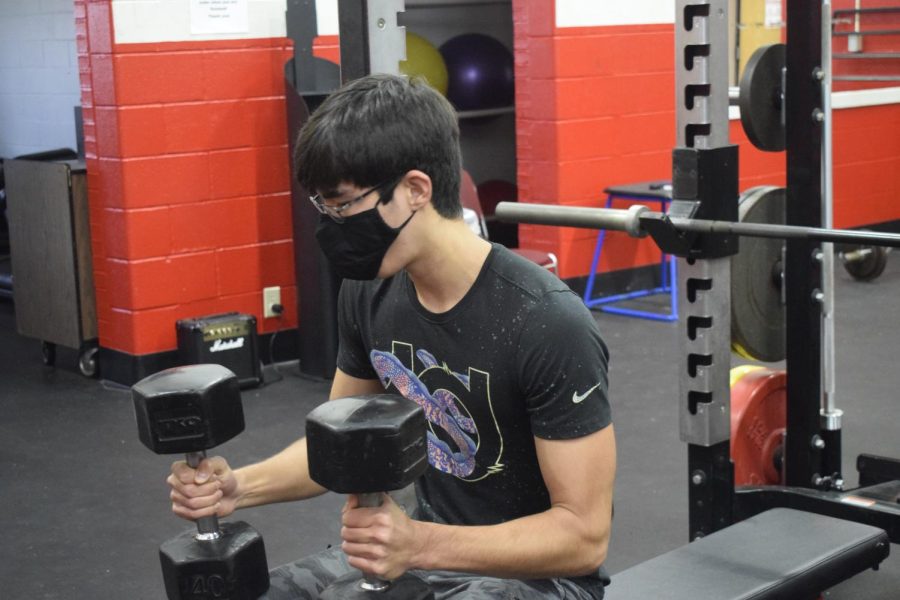Long Shot or Short Stop
The long term effects of sports and physical education
January 13, 2022
The most wonderful time of year approaches once more as students once again sign up for classes to take for the next school year. Figuring out credits for graduation, teacher recommendations, familial expectations and personal preference among many other criteria is difficult. Some of the bare minimum requirements such as those for career and technical or fine arts provide an opportunity for students to explore areas that would not be available in other situations, but physical education has been a source of contention each year for some athletes. Since students participate in sports and other athletic activities, some believe the physical activity from sports is enough to count towards a credit for graduation, while others believe sports are not all encompassing enough.
Jadyn Wallis (12) is a three sport athlete in volleyball, basketball, and track and field.
“We spend more time in a sport per week than in a P.E. class,” Wallis said. “All of the sports we have here are very active, and I feel like if you’re already putting your time towards that, you could be taking more academic classes during school instead.”
Meghan Monroe has been a physical education teacher at Central High for three years, and currently teaches Fitness Concepts, the general freshman class, and is the head coach for the varsity dance team.
“Growing up in Illinois, they actually have that rule that if you play three sports, which I did, you don’t have to take P.E. at all,” Monroe said. “So, I actually did not have to take one P.E. credit for all four years of high school. I feel like I missed out on a lot of valuable information that P.E. provides, which is the full understanding of the why we’re active. I never really knew how to kind of live a healthy lifestyle outside of sports. It’s like, well I used to play sports, but now I don’t do anything. ”
Dr. Tom Loughery, the Missouri Society of Health and Physical Educators (MOSHAPE) Executive Director staunchly defends the one credit requirement each year as the issue shows up in the House Bill 124. In 2021, the bill attempted to allow show choir and marching band to fulfill physical education graduation requirements. The argument looks to the long term of life after high school, where few people will continue to play a sport, or perform in show choir or marching band.
“There is no way participation in sports meets the standards for graduation credit or for replacing a quality P.E. program,” Loughery said.
Documents shown in court blocking the House Bill 1162 attempting to allow athletes opt out of physical education classes outline the curriculum for P.E. classes, showing the disparities between the two options. Requirements are listed, such as “4.3.1 Physical educators use fitness assessment as part of the ongoing process of helping students understand, enjoy, improve and/or maintain their physical fitness and well-being (e.g., students set goals for improvement that are revisited during the school year)” which is required by Cade’s Law. The document also lists expectations by graduation which students are expected to follow through on, such as “Willingly participate on a regular basis in physical activities that contribute to the attainment and maintenance of personal physical activity goals.” Ideally, physical education classes would teach students to appreciate the importance of health, and impart them with the skills that would last a lifetime to maintain personal health.
The legal requirements that P.E. classes must meet, including fitness testing, are most certainly not met by sports. Even if there was a day, or even a week, reserved for such activities, it would detract from the simpler enjoyment of sports that separates academics from activities.
“Sport coaches have to focus on skill and strategies for their sport, while P.E. teachers focus on skills and strategies to keep you healthy for life,” Adventure Pursuits, Yoga, and P.E. Mentor teacher Terri O’Leary said. “They are not the same thing, and therefore should not be able to be interchangeable for credit.”
Another qualm that some have is that not all coaches are certified physical education teachers. While some people have years of experience and education in order to teach healthy habits that will last a lifetime, others are self taught, and may not satisfy the legal requirements for physical education classes, or make enough of a lasting impression on students to continue with healthy living after high school.
However, even if most people do not continue to participate in sports after high school, or even after each sports season, few students take the initiative to maintain their physical health due to a P.E. class.
Joe Siervo (12) is a three sport athlete in football, basketball, and baseball. Siervo has taken multiple P.E. classes, including Fitness Concepts, Competitive Sports, Adventure Pursuits and Strength and Conditioning.
“I exercise outside of school, and go to the weight room outside of school because I want to be stronger for my sport and more fit for my sport, not because of P.E. class,” Siervo said. “I like having a healthy lifestyle and taking care of my body. PE has taught me some stuff to stay physically active, but I just like taking care of myself, eating right and getting my body right because I don’t like not being healthy because it doesn’t feel right.”
It comes as no surprise that some people consider themselves more athletic than others, and these ideas stem from much earlier in childhood. People can channel their athleticism, or lack thereof, either through sports or P.E. classes, but the lasting changes that people on both sides of the argument claim to bring are not guaranteed. Changing lifestyle habits does not come as easily as people like to think.
“I was very much, very athletic,” Monroe said. “Even without P.E. classes in high school, I had all of the things that at a very young age, to where any game you gave me, I loved.”
The biggest challenge to changing mindsets, habits, and lifestyles comes from societal concerns. American culture is stereotyped as lazy due to the necessity of cars and prevalence of advertising, all of which is beyond the control of the average person. It’s impossible to get anywhere without a car anywhere except in large cities, and the ridiculously large packaging combined with the lack of regulation of foods contributes to overconsumption. Suggesting that people bike to school or work and eat healthier is not always realistic when not everyone can bike on a highway, and the price of fresh fruits and vegetables is greater than fast food.
“I have been in close professional relationships with professors and P.E. personnel throughout the world,” Loughery said. “In many countries, they have robust adult sports programs, such as in Germany and Norway. In my travels to Asia, it was clear nearly all adults participate in some form of morning activity that keeps them active throughout their lives. Yet, research indicates that participation in high school sports programs does not transfer to adult participation in that activity after age 25.”
These sports programs in Europe begin at an early age, and extend to adulthood. Gymnastics, track and field, field hockey, boxing, rugby, curling, basketball, ice hockey, volleyball, soccer are a few among many other sports offered. These programs will fund snacks, buses to practices and even trips to Spain or the North Sea for summer camp. In China, the smaller nature of some apartments require daily grocery shopping from farmers selling their wares early in the morning, and the prevalence of public transportation increases the number of walkers.
If the problem that prevents schools in Missouri from allowing students to replace a P.E. credit is because sports do not leave a lasting impression on students to continue to exercise in later life, but classes also do not completely transfer over to a lifetime of healthy living, there leaves more problems than solutions. Very few people would claim that living a healthy lifestyle is not important to them, and the lack of a culture of healthy living that lasts into adulthood is harmful.
“Ultimately, the goal is to lead a healthy lifestyle because the brain’s important and we all want to grow up and be successful,” Monroe said. “But, if our body’s not equipped or working properly to do that, what are you going to do? All of that success and money and fame and all that is nothing if you don’t have a proper body working at its highest capability to meet all of those goals. I think that at the end of the day, that should be the number one priority.”
If pessimism is the tune that is sung, there are different options for changing rules and curriculum requirements.
“I think it’d be nice if they just looked at it from the students’ perspective,” Wallis said. “Maybe the freshman P.E. class was required, but from then on, if you had to get one or two more credits, then a sport could qualify for that.”
Others would appreciate more leniency when classes and practices clash.
“Sometimes the P.E. class that you’re in can kind of drain you that day,” Siervo said. “I’m in Strength and Conditioning, and sometimes I have to lift again after school in my practice, which drains me out.”
Also, the grading system could loosen up in certain circumstances.
“If you miss one day of class, your grade gets bumped all the way down to a B,” Siervo said. “Right now, I’ve missed a couple days of PE and my grade’s a B, but I’ve made it to almost all the days of sports, so I think it should count as a makeup.”
Even if these concessions seem too lenient, there will still always be people who genuinely enjoy physical activity and will find a method to incorporate it into daily life.
“I love walking, and I know in college you walk a ton,” Wallis said. “That’s already active as it is, and then I also want to continue playing club sports on the side just so that it’s a little bit more low key and I can focus on my schoolwork for college and still be active. I just have a connection with sports that I’m not ready to be done with.”
Even if P.E. classes were not required, there are students who would still choose to take P.E. classes as an elective.
“I actually would take P.E. classes if they were optional,” Siervo said. “Especially competitive sports because it’s a fun time with friends, since in sports it’s super competitive and not all my friends play sports.”
Part of the allure of sports that can make a lasting impression is due to its voluntary nature. An activity outside of school is a safe space for students to bond with like minded individuals, and after putting in the time and effort after years, students learn leadership, as seen in captain and co-captain positions. Doubtless different from P.E. classes, each situation is an opportunity to learn.


